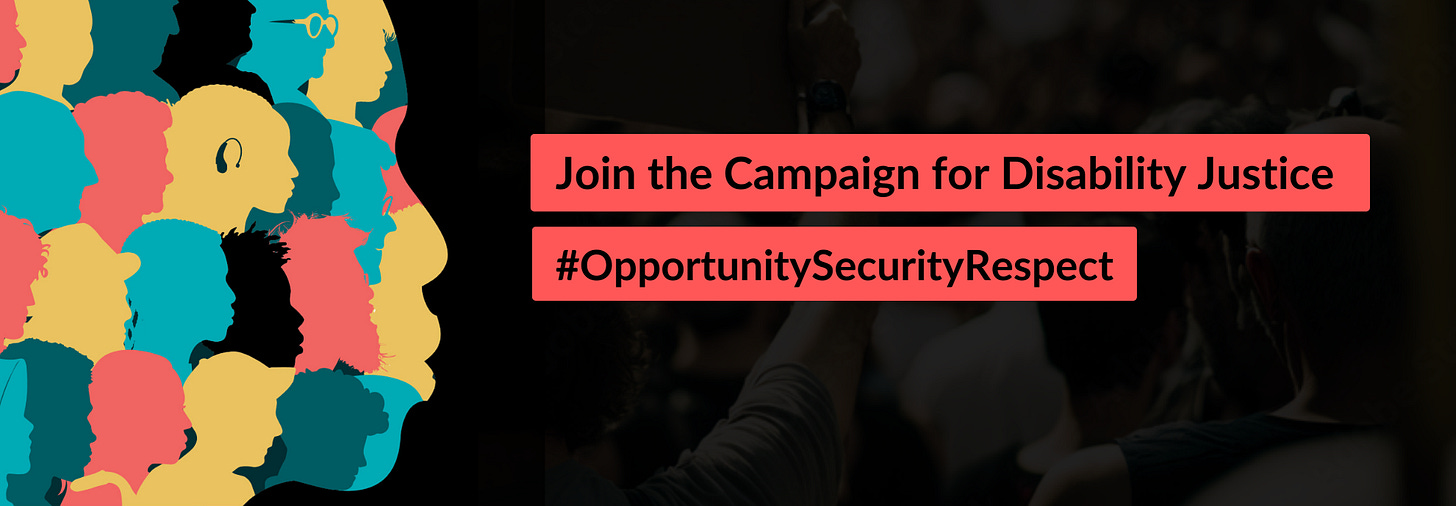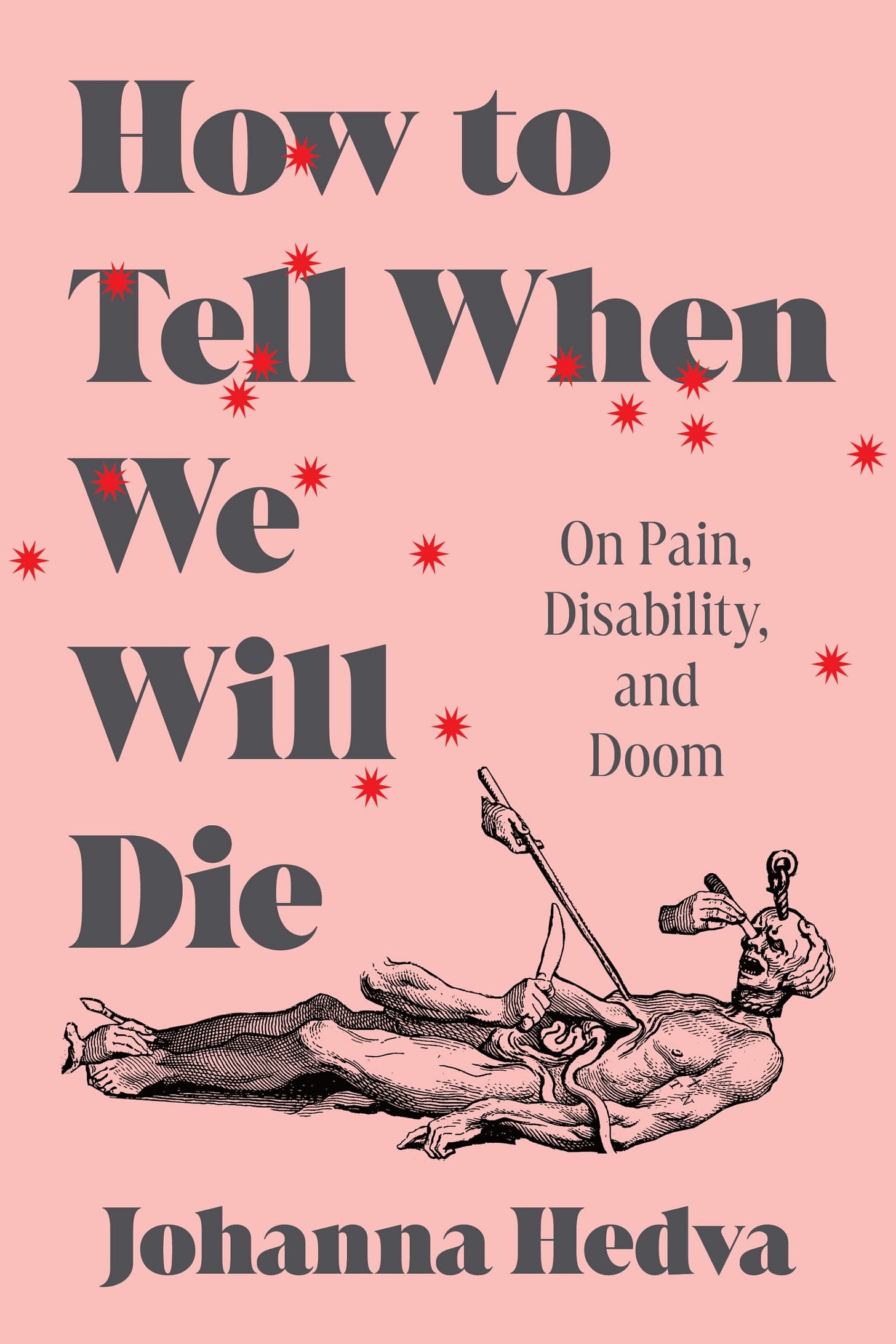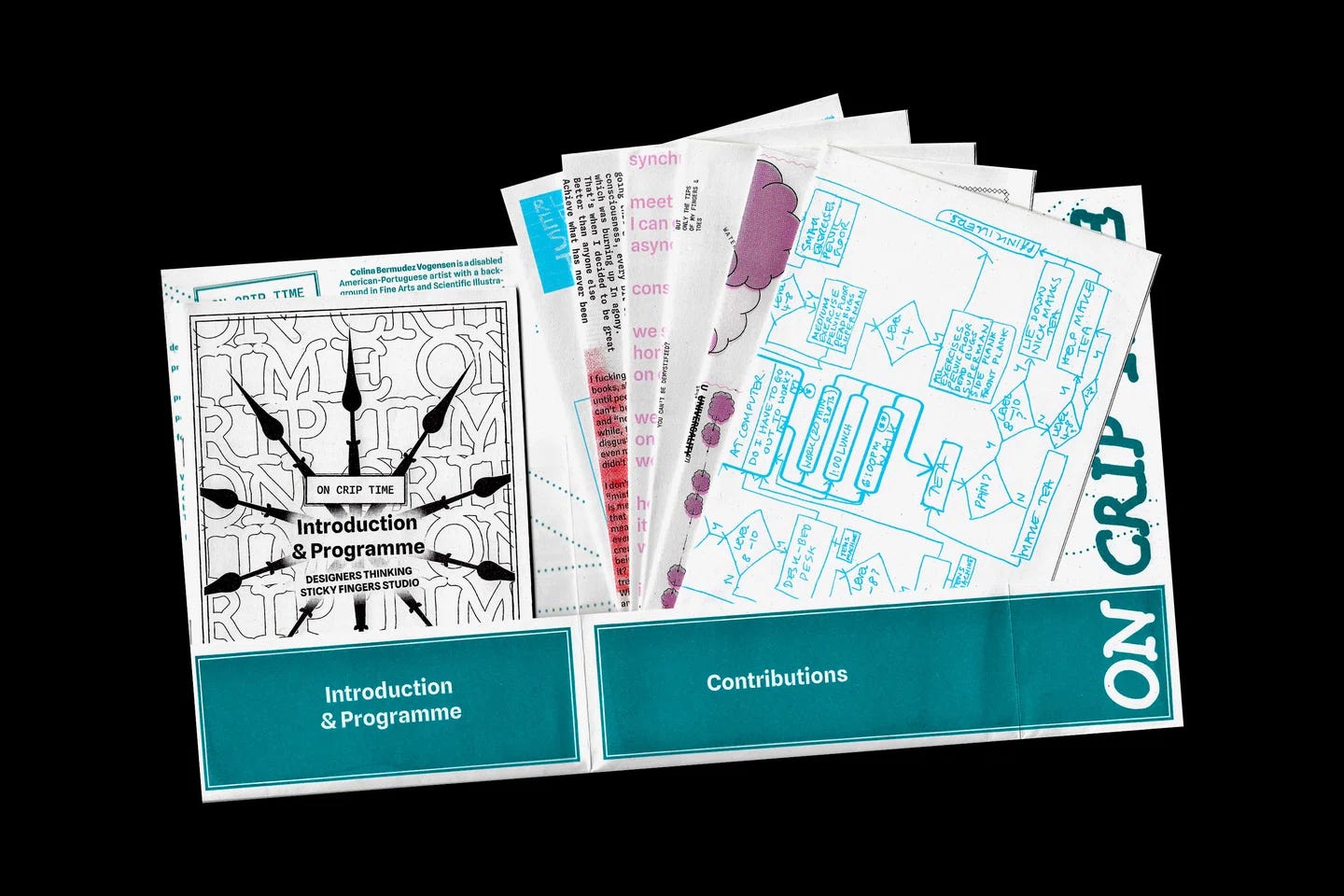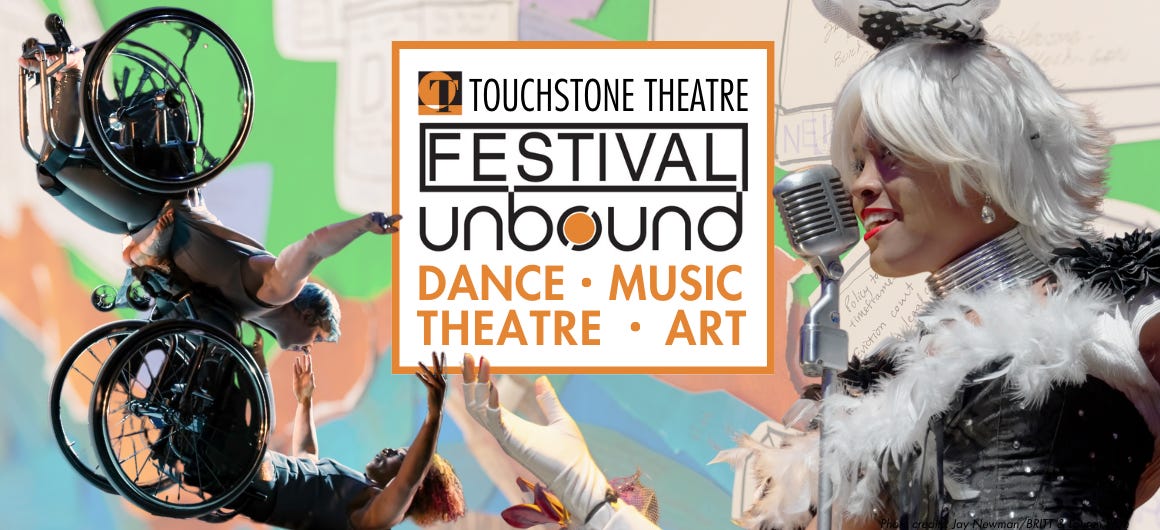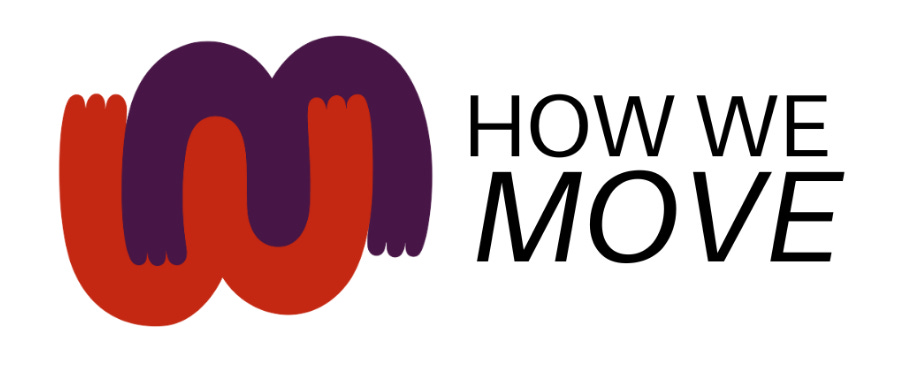Crip News v.149
The NEA's Disability Arts Listening Session (today!), "disability justice," new works, calls, and events.
it’s a long one today, y’all! click through at the bottom of this email for the full issue. -kg
NEWS
Federal Disability Arts Listening Session
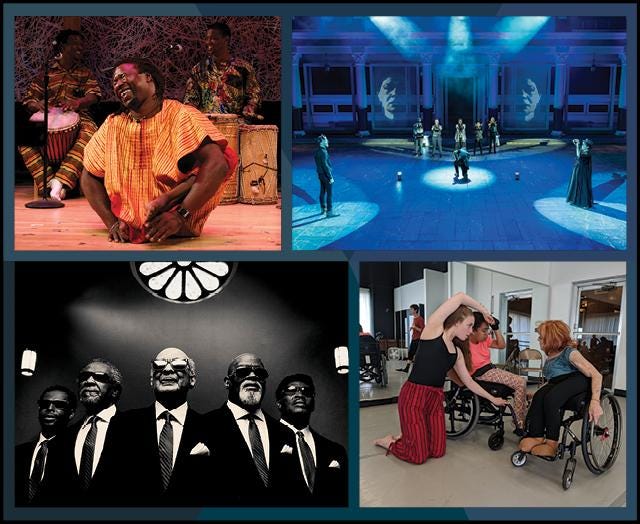
Today, Sept. 30th from 3:30 - 5pm ET on Zoom, the U.S. National Endowment for the Arts is hosting an event to seek input “on what artists and other cultural workers with disabilities need to create, learn, and perform in a safe, healthy, and productive environment through access accommodations, adjusted work schedules, adaptive equipment, accessible spaces, and other types of accommodations.”
Let’s pack the house! For your consideration from past issues of Crip News:
Tell the NEA to stop funding organizations that pay disabled workers subminimum wages! You shouldn’t be able to pay disabled people pennies an hour and also receive public funding. Our voices are especially important right now as the Department of Labor signals it may eliminate subminimum wages any day.
Disabled artists and cultural workers need guaranteed adequate incomes that don’t affect public benefit program eligibility to protect against the economic precarities of the inaccessible cultural workforce. (Stay tuned for more on this topic from work I’ve been doing on the Guaranteed Income for Artists program at Creatives Rebuild New York).
Artists and workers also need anti-discrimination support. Federal laws often don’t apply to small organizations. Cultural organizations rarely have capacity to be involved with programs like Competitive Integrated Employment. And the lack of interpretive guidance and intermediary support when dealing with harmful employers makes legislative protections effectively unenforceable. (Stay tuned for more on this topic from work I’ve been doing on the Artist Employment Program at Creatives Rebuild New York.)
What else? If you can’t make it but have an idea for the NEA, drop it in the comments and we will relay it during the event.
And register for the event here.
“Disability Justice”
Every so often, I report on some of the corners of the internet where I notice this term is appearing. Here are some recent findings:
YouTuber Lý Luan offers “Marxist tickly tingles” in an “educational ASMR” video about disability justice, reading from work by the Cầu Kiều Collective and Sins Invalid.
NXTHVN, Inc. was recently announced as a grantee of the NEA’s $12 million ArtsHERE pilot program for a “disability justice project with the formation of a working group, conduction of research and a full community audit, and implementation of new strategies as part of their work with the Dixwell and New Haven communities” in Connecticut. (Another disability organization, Special Needs Support Center, was also awarded funds for “developing and implementing disability-friendly practices, training staff, and consulting.”)
In the U.K., the “Campaign for Disability Justice” has sent an open letter to the Minister for Social Security and Disability calling on the Government to “work with organisations led by Disabled people to guarantee: Opportunity to work, financial Security and Respect, for all Disabled people, whether in work or not.”
Meanwhile, the Trust for London has announced the second wave of grants to Deaf and disability organizations awarded under its £3 million disability justice fund.
It’s always fascinating and upsetting to search for “disability justice” on Coursehero, a plagiarist’s delight. Students have asked AI and other users to:
“write a main point about fostering disability justice and two sub points about this topic”
(If anyone has an account that can view the answers, please post them in the comments!)
Natalie Weizenbaum has published an essay on “COVID Denialism and Disability Justice” on their blog.
For Minnesota Women’s Press, Amy Gage reports on how nonprofits are “Shifting the Perception of Disabilities,” including how some are using the 10 principles of disability justice.
New Works
How to Tell When We Will Die: On Pain, Disability, and Doom by Johanna Hedva is out now from Lena Waithe’s Hillman Grad Books project.
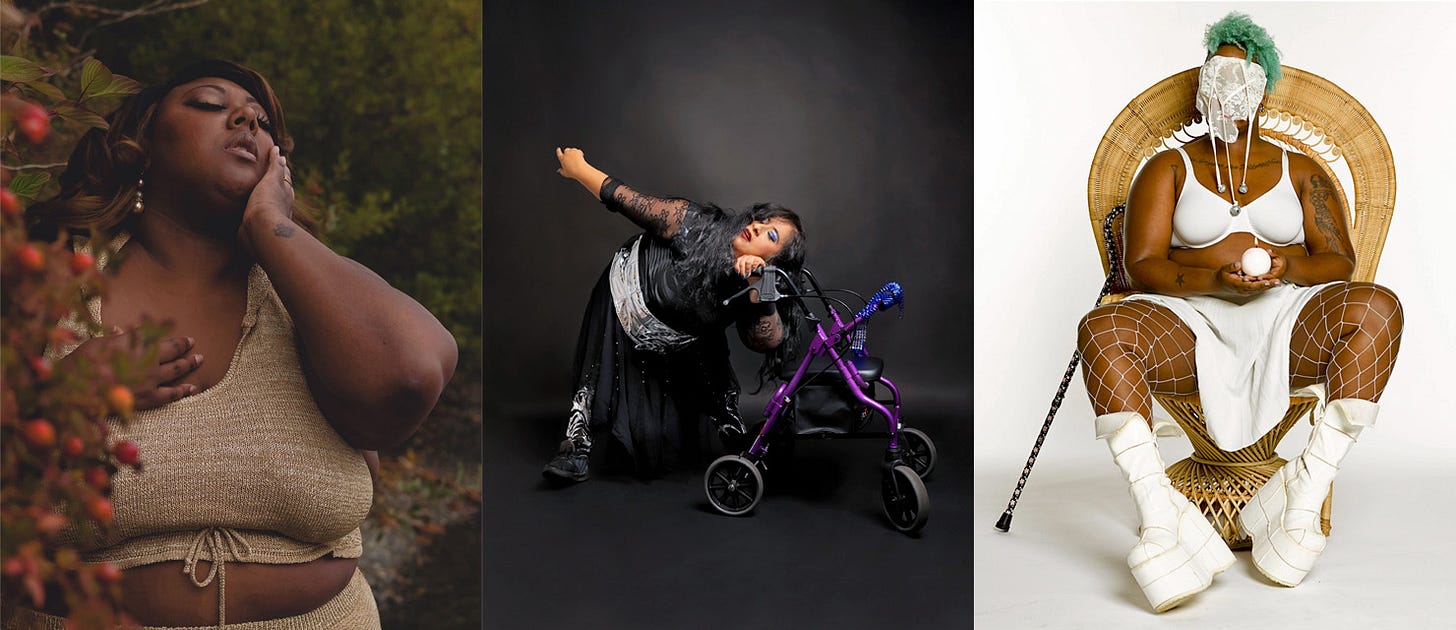
Mouthwater: A Disabled Dance Festival, running through Oct. 13th in Seattle, is using “anti-capitalist, anti-fascist, pro-Black, Disability Justice-informed, Afrofuturist, sex-educated and practical” values to catalyze “an arts hub by and centering Black and Indigenous Disabled artists to present, collaborate and get uplifted for their crafts.” The festival is co-founded by Saira Barbaric, NEVE Mazique, and Vanessa Hernández Cruz, with co-curators Mx. Pucks A’plenty and India Harville. See more coverage in Dance Magazine and Seattle Times.
The sold-out publication On Crip Time is the result of Kaiya Waerea and Michiel Teeuw’s eight-week program with Designer’s Thinking “to question how systems of time are enforced to prevent disabled people from accessing the future.” Featuring work by Celina Bermudez Vogensen, Claudia Rose Walder, emma kath cullen, Helen Stratford, India Boxall, Lindsey Allen, Oren Shoesmith, Rabindranath X Bhose, Ray Soller, Ren Sheikh & shreyasi pathak. See more coverage by Ellis Tree for It’s Nice That.
Touchstone Theatre’s annual 5-day Festival UnBound happens this week in Bethlehem, PA, featuring programming from Kinetic Light, visually impaired artists Mary Ann Dunwoodie, Michael Freeman, Dianne Michels, and Terry Newhard, playwright José Diaz, and more.
Cavar's novel Failure to Comply, out now from Featherproof Books, is “an abolitionist text concerned with trans, disabled, and Mad liberation as a speculative art.”
University of Atypical’s Bounce Festival runs this week, Oct. 4th through 6th, in Belfast and Derry~Londonderry, Northern Ireland. The program features all d/Deaf, disabled and neurodivergent artists.
CALLS
How We Move, a “first-of-its-kind dance intensive for and by multiply marginalized Disabled creatives from across the U.S.” led by India Harville and JJ Omelagah of Embraced Body, Kayla Hamilton of Circle O, and Movement Research, is seeking applications for a six month hybrid program for “multiply marginalized Disabled artists to move together, collaborate, expand leadership skills, and build cross-disability community.” Apply by Oct. 31. More here.
Submissions are open for Issue 2 of the COVID Cautious Queers Zine. Submit by Oct. 31. More here.
EVENTS
The Bodily Autonomy Institute: A Disabled and Trans Perspective
Oct. 8 - 9, 12:00 - 2:30pm ET, on Zoom
This 2-part institute, facilitated by Ericka Ayodele Dixon and Sebastian Margaret from the Transgender Law Project’s Disability Project, will use small group breakouts and political education conversations to engage participants on the following themes: Examine the history and current impacts of eugenics in influencing anti-trans policies and reproductive rights rollbacks; Understanding the realities of bodily autonomy as experienced within disability community and how systemic ableism fuels all attacks on people’s right to self determination; Expand philanthropy’s capacity to identify ableism and eugenics as potent in the rise of attacks on bodily autonomy to develop the capacity for a nuanced assessment of funding needs that best support critical organizing to meet this specifically ableist informed onslaught of attacks.
EVERYTHING FOR EVERYONE: a remote body conversation with Eman Abdelhadi
Saturday, Oct. 5th, 3pm GMT, online
This event is the first in a series of fundraisers that aim to do two things: 1, raise funds for those facing genocide in Palestine, Congo and Sudan; and 2, explore and begin to expand the possibilities of what crip activism can be. We borrow the title from Eman’s book Everything for Everyone for this first gathering, not for the convenience of it, but to set intention - this is the world we want to build. The world we want to work towards. Where there is everything for everyone. Join us in our first steps to do so and as we explore what liberation means and the importance of collective imagination as the action that will get us there.
Starship Somatics with Petra Kuppers
Tuesdays through Dec. 17th, 11am - 12pm ET, on Zoom
Starship Somatics engage our bodymindspirits as portals, as trancemobiles that honor pasts and jet us toward speculative futures, into the earth and among the stars, in flux and transformation. Our classes will use improvised movement (inner and outer movement, as is accessible and appropriate to you), ambient music, dream journeys, writing, and drawing as our transportation devices: firmly grounded in the sensory immediacy of our beds, sofas, floors and windows, and flying wide to honor ways of being of all kinds.




